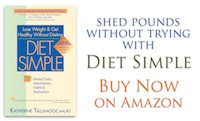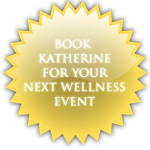5 So-Called Health Foods You Should Avoid
- At March 02, 2012
- By Katherine
- In Articles, News
 5
5
Featured on CNN’s Health Minute
Read it to find out why this article went VIRAL!
Recently published in LiveScience.com, published in “The Washington Post,” and broadcast on WOR Radio New York City…
Eating healthy can be harder than you think, thanks to an enterprising food industry that wants us to consume more than we need. That’s because our country’s agricultural system produces twice what most people require – 3,900 calories per person per day, according to the U.S. Department of Agriculture’s Economic Research Service. This encourages creative marketing to unload the excess, much of it made with cheap ingredients, having long shelf-lives, and minimal nutritional value – the kinds of “food” with the highest profit margins.
As a nutrition consultant, I know that words such as “low fat,” “high fiber,” “multigrain,” gluten free,” and “natural” can confuse even the most sophisticated customers into believing what they’re buying is healthful. In fact, market research proves it.
What can you do? First, make a habit of reading the ingredients list, not just the Nutrition Facts panel. And remember the following products worth resisting…
Reduced-fat peanut butter
The oil is the healthiest part of a peanut* or a tree nut, containing most of the nutrients, so there’s no advantage to taking it out. In fact, it’s worse because it robs the peanut butter of its health benefits. “Reduced-fat peanut butter has as many calories and more sugar than the regular,” says Bonnie Liebman, nutrition director for the Center for Science in the Public Interest.
Instead: Buy regular peanut butter. Eating one or two ounces of nuts daily is associated with reductions in heart disease and cancer risk. A recent Harvard study showed that eating nuts is associated with lower body weights.
Enhanced water
Sports drinks, diluted soft drinks with salt, are only needed during intense exercise exceeding one hour or in extreme heat. Drinks such as Vitaminwater (c) are essentially sugary drinks with a vitamin pill. They are “unequivocally harmful to health,” says Walter Willett, professor of epidemiology and nutrition at Harvard’s School of Public Health. “Whether vitamins dissolved in water have any benefit will depend on who you are and whether you are already getting enough. . . . Some people may be getting too much of some vitamins and minerals if they add vitamin water on top of fortified foods and other supplements.” A recent Iowa Women’s Health Study found an association between certain commonly used vitamin and mineral supplements and increased death rates. But the worst offenders in this category are energy drinks such as Red Bull, Sobe Life Water, or Monster Drinks. They’re not only high in sugar, but most contain stimulants which may be harmful, especially with medical conditions like high blood pressure.
Instead: Drink water, ideally from the tap (“Eau du Potomac,” as it’s known locally). It’s the best drink for hydrating your body, is naturally calorie-free and contains fluoride to prevent tooth decay. No supplement matches the nutrients in whole foods such as fruits, vegetables, nuts and whole grains.
Energy bars
The reputation of these bars, also known as meal replacement bars, is that they are healthy, aid in weight loss or help build muscle. In fact, they are calorie bombs: candy bars with vitamins, protein or fiber added. For most of them, sugar is either the first (predominant) or second ingredient.
Instead: Snack on fruit or veggies for weight loss and yogurt for muscle gain. If you’re hiking a long distance and want a healthful, nonperishable calorie bomb, try nuts and dried fruit.
Multigrain foods
Multigrain breads, crackers and cereals are often the most confusing foods. People see “multigrain” and think “whole grain.” That’s not necessarily so. This is an important distinction because people who eat whole grains have a lower incidence of diabetes, heart disease and cancers, and are less likely to be overweight compared with those who eat refined grains. Note that when “enriched wheat flour” is listed in the ingredients, that’s refined flour.
Instead: Be sure a whole grain, such as whole wheat, whole rye, whole oats or brown rice, is the first and preferably the only grain in the ingredient list. A great example is a cereal listing whole rolled oats as the only grain or a bread listing whole wheat as the only wheat. Alternatively, consider an egg for breakfast. “The huge amounts of refined starch and sugar that many people eat for breakfast, often thinking that this is the healthy choice, does far more damage to their well-being than an egg,” says Harvard’s Willett.
Non-fried chips and crackers
It’s easy to believe these foods are healthful because of labels such as “baked,” “low fat” or “gluten free.” But most are made with refined grain or starch, which provide plenty of calories and few nutrients. Popchips, for example, are a new product marketed as healthful. But the ingredients are highly refined potato flakes, starch, oil, salt and about 14 additional things. Pita chips, made with white flour, oil, salt and several more ingredients, are no better. To boot, research shows that too much refined grains and starches increases the risk for heart disease, cancers, diabetes and weight gain.
Instead: Try Wasa or Finn Crisp Original Rye crackers. They’re 100 percent whole grain and have little sodium. If you’d like a chip, try Terra Chips, made with sliced vegetables, or even a 100 percent whole grain chip fried in a healthy oil, such as olive or canola. Tortilla chips and SunChips are two examples. “Now that trans fats have been removed from most cooking oils, the healthiest part of potato chips is the fat,” Willett says. “And chips made of whole grains rather than potatoes, like Frito-Lay’s SunChips, can legitimately be considered a health food,” so long as you keep to the one-ounce serving size.
*Peanuts are technically a legume, but we call them nuts nutritionally because their nutritional characteristics and health benefits closely match those of tree nuts.
Find this article originally printed in The Washington Post February 28, 2012
Listen to me discuss “Health Foods You Should Avoid” on WOR 710 Talk Radio NYC “The Joan Hamburg Show”
For more fabulous tips and simple, effective ways to lose weight,
buy her book, Diet Simple!










passive fire protection products nz
In summer, a key a part of our passive cooling approach is ventilating the home at night time.
rug cleaning
I’m noow not sure the place you are getting youur information, however good topic.
I must spend a while studying more or understanding more.
Thanks forr fantastic info I was searching for this information for my mission.
CarrotLlines App
Great read to help decipher some unhealthy misconceptions!
-CarrotLines App
Katherine
Thank you so much!
Grace
great newsletter! loved the videos!